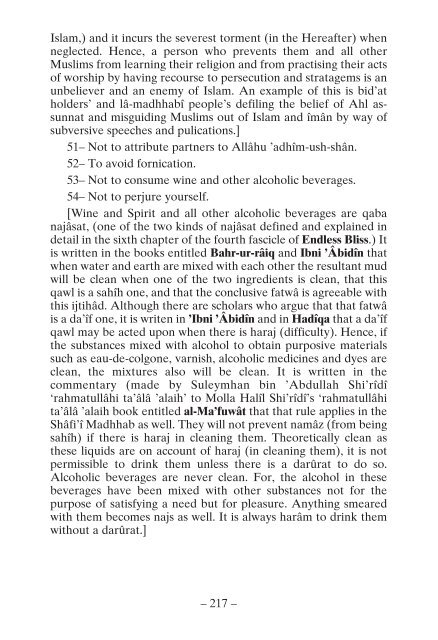Miftah-ul-Janna (Booklet for way to Paradise)
You also want an ePaper? Increase the reach of your titles
YUMPU automatically turns print PDFs into web optimized ePapers that Google loves.
Islam,) and it incurs the severest <strong>to</strong>rment (in the Hereafter) when<br />
neglected. Hence, a person who prevents them and all other<br />
Muslims from learning their religion and from practising their acts<br />
of worship by having recourse <strong>to</strong> persecution and stratagems is an<br />
unbeliever and an enemy of Islam. An example of this is bid’at<br />
holders’ and lâ-madhhabî people’s defiling the belief of Ahl assunnat<br />
and misguiding Muslims out of Islam and îmân by <strong>way</strong> of<br />
subversive speeches and p<strong>ul</strong>ications.]<br />
51– Not <strong>to</strong> attribute partners <strong>to</strong> Allâhu ’adhîm-ush-shân.<br />
52– To avoid <strong>for</strong>nication.<br />
53– Not <strong>to</strong> consume wine and other alcoholic beverages.<br />
54– Not <strong>to</strong> perjure yourself.<br />
[Wine and Spirit and all other alcoholic beverages are qaba<br />
najâsat, (one of the two kinds of najâsat defined and explained in<br />
detail in the sixth chapter of the fourth fascicle of Endless Bliss.) It<br />
is written in the books entitled Bahr-ur-râiq and Ibni ’Âbidîn that<br />
when water and earth are mixed with each other the res<strong>ul</strong>tant mud<br />
will be clean when one of the two ingredients is clean, that this<br />
qawl is a sahîh one, and that the conclusive fatwâ is agreeable with<br />
this ijtihâd. Although there are scholars who argue that that fatwâ<br />
is a da’îf one, it is writen in ’Ibni ’Âbidîn and in Hadîqa that a da’îf<br />
qawl may be acted upon when there is haraj (diffic<strong>ul</strong>ty). Hence, if<br />
the substances mixed with alcohol <strong>to</strong> obtain purposive materials<br />
such as eau-de-colgone, varnish, alcoholic medicines and dyes are<br />
clean, the mixtures also will be clean. It is written in the<br />
commentary (made by S<strong>ul</strong>eymhan bin ’Abd<strong>ul</strong>lah Shi’rîdî<br />
‘rahmat<strong>ul</strong>lâhi ta’âlâ ’alaih’ <strong>to</strong> Molla Halîl Shi’rîdî’s ‘rahmat<strong>ul</strong>lâhi<br />
ta’âlâ ’alaih book entitled al-Ma’fuwât that that r<strong>ul</strong>e applies in the<br />
Shâfi’î Madhhab as well. They will not prevent namâz (from being<br />
sahîh) if there is haraj in cleaning them. Theoretically clean as<br />
these liquids are on account of haraj (in cleaning them), it is not<br />
permissible <strong>to</strong> drink them unless there is a darûrat <strong>to</strong> do so.<br />
Alcoholic beverages are never clean. For, the alcohol in these<br />
beverages have been mixed with other substances not <strong>for</strong> the<br />
purpose of satisfying a need but <strong>for</strong> pleasure. Anything smeared<br />
with them becomes najs as well. It is al<strong>way</strong>s harâm <strong>to</strong> drink them<br />
without a darûrat.]<br />
– 217 –

















